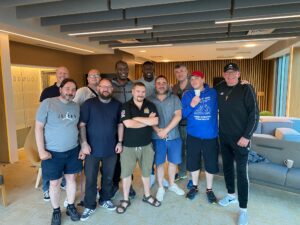Developing Veterans’ Resilience and Wellbeing through Physical Activity
The RAF Association, working together with Loughborough University and other partners, received funding through the Positive Pathways programme to pilot a resilience development pathway programme for Veterans. Delivered through physical and wellbeing activities and workshops, the programme aimed to enhance the social resilience, mental health and wellbeing of Veterans in the East Midlands experiencing mental health issues.
Utilising Loughborough University’s staff and facilities, participants took part in a range of activities, led by experts, designed to develop resilience and enhance mental health and wellbeing. Expertise included nutrition, improving sleep quality, social resilience, and physical activity.

Throughout the programme participants were encouraged to develop a sense of togetherness through the activities, which helped to promote positive mental health and reduce isolation following completion of the programme.
By the end of the course participants had a plan of action to help sustain the improvements they have made, including an opportunity to attend a follow-up meeting with other programme beneficiaries.
Measuring the Impact
The programme was successfully received with quantitative data demonstrating sustained significant and positive increases in resilience, social identification (the sense of togetherness as a cohort), and most notably mental health and wellbeing from the start of the programme to the 3-month follow-up.
The quantitative results were reinforced by qualitative data, which provided evidence of the strength of the programme’s impact.
Participants commented on the effectiveness of the programme, with some describing it as either ‘lifesaving’ or ‘life changing’ for them. One participant remarked that “…to be honest I didn’t reckon that this would be much cop, I just thought well I’d give it a go. It’s changed my life and it’s changed my life massively.” While another commented: “What you have done for me has been life changing…. This has provided the light I needed and a compass of where I want to go and how to get there.”
Overall, the data suggests that the programme has had a significant and positive impact on the lives of the participants, such as enhancing their resilience, mental health and wellbeing.
Programme structure and approach
In terms of the structure of the programme, participants enjoyed the mix of physical activities and educational workshops. One participant said: “I enjoyed doing the activities and the sports… But the academic stuff was just brilliant, the sleep, the mindfulness, the FiT [Finding it Tough] course… was all really positive stuff.”
Participants particularly liked the approach from the programme facilitators, who joined in with the physical activities and workshops, making it feel more like a team and creating an inclusive environment. Some participants suggested that this was an approach that should set the benchmark for how courses in this field are run: “This is a fresh approach in helping veterans that feels inclusive, respectful and the staff/tutors felt like part of the team”. Another participant suggested: “Honestly, this is the way that courses need to go for helping people with PTSD or other mental health issues. This is the approach that we need, this is the way it needs to develop and go forward”.
Developing social identity
One of the aims of the course was to establish a positive social identity around the cohort, which would sustain beyond the length of the programme, providing continued social support. The dynamics of the group were an important factor in the design of the programme, creating an environment and a set of activities that encouraged participants to feel a sense of togetherness as a cohort. The data emphasises how the relationships between the participants were built, how the activities helped to foster a sense of team building, and how they felt able to share both personal and sensitive information with each other, and how this helped some of them resolve issues that had been troubling them.
As well as the short-term impact, there was also evidence of a longer-term effect with respect to the development of a support network that could sustain beyond the completion of the course. One participant remarked: “Have not felt united or part of a group and this programme has given me something I have not had and missed. I now have a support network that is there for me no matter what and do not judge me.”